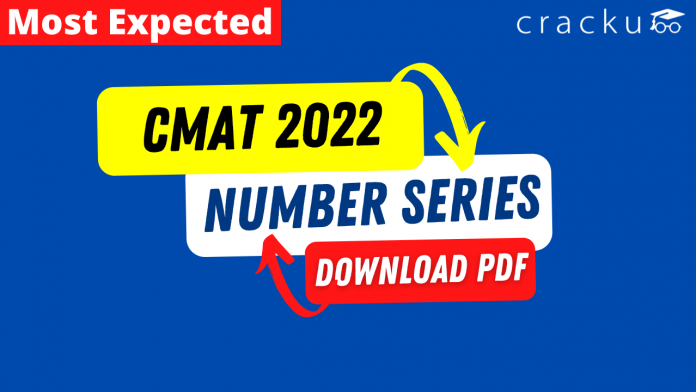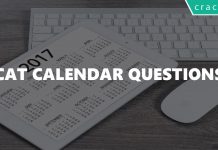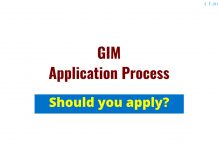Number Series Questions for CMAT 2022 – Download PDF
Here you can download CMAT 2022 – important Number Series Questions PDF by Cracku. Very Important Number Series Questions for CMAT 2022 based on asked questions in previous exam papers. These questions will help your CMAT preparation. So kindly download the PDF for reference and do more practice.
Download Number Series Questions for cmat
Take CMAT mock tests here
Download CMAT previous papers PDF
Question 1: What should come next in the number series ?
1 8 3 6 5 4 7 2 9 1 8 3 6 5 4 7 2 1 8 3 6 5 4 7 1 8 3 6 5 4
a) 1
b) 2
c) 4
d) 8
e) None of these
Question 2: What will come in place of both the question marks (?) in the following question ?$\frac{(?)^{0.6}}{104}=\frac{26}{(?)^{1.4}}$
a) 58
b) -48
c) -56
d) 42
e) -52
Question 3: Out of the fractions $\frac{1}{2}, \frac{7}{8}, \frac{3}{4}, \frac{5}{6}$, and $\frac{6}{7}$ what is the difference between the largest and smallest fractions ?
a) $\frac{7}{13}$
b) $\frac{3}{8}$
c) $\frac{4}{7}$
d) $\frac{1}{6}$
e) None of these
Question 4: What will come in place of the question mark (?) in the following number series?
9 10 39 220 ? 14382
a) 1589
b) 1598
c) 1958
d) 1985
e) 1835
Question 5: What will come in place of thequestion mark (?) in the following number series?
121 238 472 ? 1876 3748
a) 1008
b) 948
c) 944
d) 940
e) 1005
Get 5 CMAT mocks at just Rs.299
Question 6: What will come in place of thequestion mark (?) in the following number series?
44 ? 99 148.5 222.75 334.125
a) 44
b) 55
c) 66
d) 33
e) 35
Question 7: What will come in place of thequestion mark (?) in the following number series?
33 16.5 ? 24.75 49.5 123.75
a) 18.5
b) 16.5
c) 8.5
d) 8.25
e) None of these
Question 8: What will come in place of the question mark (?) in the following number series?
20 23 30 43 64 ?
a) 95
b) 90
c) 100
d) 105
e) 96
Question 9: What should come in place of the question mark (?) in the following number series ?
1, 5, 17, 53, 161, 485, ?
a) 1168
b) 1254
c) 1457
d) 1372
e) None of these
Question 10: What approximate value should come in place of the question mark (?) in the following question?
$54.786 \div 10.121 \times 4.454 = ?$
a) 84
b) 48
c) 118
d) 58
e) 24
Download CMAT Previous Papers PDF
Question 11: What should come in place of the question mark (?) in the following number series?
2 5 11 23 47 95 ?
a) 168
b) 154
c) 191
d) 172
e) None of these
Question 12: What should come in place of the question mark (?) in the following number series?
1 4 14 45 139 422 ?
a) 1268
b) 1234
c) 1272
d) 1216
e) None of these
Instructions
What should come in place of question mark (?) in the following number series ?
Question 13: 31, 35, 44, 60, 85, ?
a) 121
b) 111
c) 109
d) 97
e) None of these
Question 14: 9, 49, 201, 1009, ?, 20209, 80841
a) 4054
b) 4049
c) 4050
d) 4041
e) None of these
Question 15: 1, 121, 441, 961, 1681, ?
a) 2701
b) 2511
c) 2611
d) 2801
e) None of these
Question 16: 668, 656, 632, 584, ?, 296
a) 392
b) 438
c) 488
d) 536
e) None of these
Question 17: 36, 20, ?, 8, 6, 5
a) 10
b) 12
c) 14
d) 16
e) None of these
Question 18: What is the least number to be added to 2530 to make it a perfect square ?
a) 50
b) 65
c) 75
d) 80
e) None of these
Question 19: What would be the compound interest accrued on an amount of Rs. 9,000 at the rate of 11 p.c.p.a. in two years ?
a) Rs. 2089.90
b) Rs. 2140.90
c) Rs. 2068.50
d) Rs. 2085.50
e) None of these
Question 20: 16 8 12 30 ? 472.5
a) 104
b) 103
c) 106
d) 105
e) None of these
Answers & Solutions:
1) Answer (A)
The series can be shown as below
1 8 3 6 5 4 7 2 9
1 8 3 6 5 4 7 2
1 8 3 6 5 4 7
1 8 3 6 5 4
After this, the series has to repeat itself and hence, the next term will be 1
2) Answer (E)
$\frac{(x)^{0.6}}{104}=\frac{26}{(x)^{1.4}}$
${(x)^{0.6}} * {(x)^{01.4}}$ = 104*26
${(x)^{2}}$ = 104*26
x = ±52
3) Answer (B)
Given values are ,
$\frac{1}{2}$ = 0.5
$\frac{7}{8}$ = 0.87
$\frac{3}{4}$ = 0.75
$\frac{5}{6}$ = 0.83
$\frac{6}{7}$ = 0.86
∴ Required difference = $\frac{7}{8}$ – $\frac{1}{2}$ = (7-4)/8 = 3/8
4) Answer (A)
The pattern followed is :
9 $\times 1 + 1^2$ = 10
10 $\times 3 + 3^2$ = 39
39 $\times 5 + 5^2$ = 220
220 $\times 7 + 7^2$ = 1589
1589 $\times 9 + 9^2$ = 14382
5) Answer (D)
Each number is multiplied by 2 and then 4 is subtracted from it.
121 $\times 2 – 4$ = 238
238 $\times 2 – 4$ = 472
472 $\times 2 – 4$ = 940
940 $\times 2 – 4$ = 1876
1876 $\times 2 – 4$ = 3748
6) Answer (C)
Each number is multiplied by $\frac{3}{2}$
44 $\times \frac{3}{2}$ = 66
66 $\times \frac{3}{2}$ = 99
99 $\times \frac{3}{2}$ = 148.5
148.5 $\times \frac{3}{2}$ = 222.75
222.75 $\times \frac{3}{2}$ = 334.125
7) Answer (B)
The pattern followed is :
33 $\times \frac{1}{2}$ = 16.5
16.5 $\times \frac{2}{2}$ = 16.5
16.5 $\times \frac{3}{2}$ = 24.75
24.75 $\times \frac{4}{2}$ = 49.5
49.5 $\times \frac{5}{2}$ = 123.75
8) Answer (A)
Numbers of the form $n^2 – (n-1)$ are added, where $n$ is an integer starting from 2
23 $+ 2^2 – 1$ = 23
23 $+ 3^2 – 2$ = 30
30 $+ 4^2 – 3$ = 43
43 $+ 5^2 – 4$ = 64
64 $+ 6^2 – 5$ = 95
9) Answer (C)
The pattern here followed is :
1 * 3 + 2 = 5
5 * 3 + 2 = 17
17 * 3 + 2 = 53
53 * 3 + 2 = 161
161 * 3 + 2 = 485
485 * 3 + 2 = 1457
10) Answer (E)
Expression : $54.786 \div 10.121 \times 4.454 = ?$
= $\frac{55}{10} \times 4.5$
= $24.75 \approx 24$
11) Answer (C)
The pattern here followed is :
2 * 2 + 1 = 5
5 * 2 + 1 = 11
11 * 2 + 1 = 23
23 * 2 + 1 = 47
47 * 2 + 1 = 95
95 * 2 + 1 = 191
12) Answer (C)
The pattern here followed is :
1 * 3 + 1 = 4
4 * 3 + 2 = 14
14 * 3 + 3 = 45
45 * 3 + 4 = 139
139 * 3 + 5 = 422
422 * 3 + 6 = 1272
13) Answer (A)
The pattern here followed is :
31 + $2^2$ = 35
35 + $3^2$ = 44
44 + $4^2$ = 60
60 + $5^2$ = 85
85 + $6^2$ = 121
14) Answer (D)
The pattern here followed is :
9 * 5 + 4 = 49
49 * 4 + 5 = 201
201 * 5 + 4 = 1009
1009 * 4 + 5 = 4041
4041 * 5 + 4 = 20209
20209 * 4 + 5 = 80841
15) Answer (E)
The pattern here followed is :
$1^2$ = 1
$11^2$ = 121
$21^2$ = 441
$31^2$ = 961
$41^2$ = 1681
$51^2$ = 2601
16) Answer (C)
The pattern here followed is :
668 – 1 * 12 = 656
656 – 2 * 12 = 632
632 – 4 * 12 = 584
584 – 8 * 12 = 488
488 – 16 * 12 = 296
17) Answer (B)
The pattern here followed is :
$\frac{36}{2} + 2$ = 20
$\frac{20}{2} + 2$ = 12
$\frac{12}{2} + 2$ = 8
$\frac{8}{2} + 2$ = 6
$\frac{6}{2} + 2$ = 5
18) Answer (E)
We know that $50^2 = 2500$ and $51^2 = 2601$
$\because$ 2500 < 2530 < 2601
$\therefore$ Required number = 2601 – 2530 = 71
19) Answer (E)
$C.I. = P [(1 + \frac{R}{100})^T – 1]$
= $9000 [(1 + \frac{11}{100})^2 – 1]$
= $9000 [(1.11)^2 – 1]$
= $9000 \times (1.2321 – 1)$
= $9000 \times 0.2321$ = Rs. $2,088.90$
20) Answer (D)
Odd multiples of $\frac{1}{2}$ are multiplied
16 $\times \frac{1}{2}$ = 8
8 $\times \frac{3}{2}$ = 12
12 $\times \frac{5}{2}$ = 30
30 $\times \frac{7}{2}$ = 105
105 $\times \frac{9}{2}$ = 472.5





